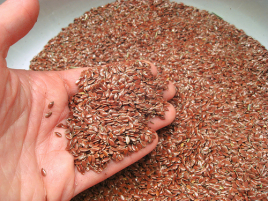Flaxseed Oil – Healthy Alternative for Vegetarians
By Yamunacarya Das | Дек 03, 2011

Ancient folklore had it that flax seeds were blessed, and they could bring good fortune; restore overall health and ward of evil forces. Nevertheless at recent times it is no more different than before. Research has shown flax seeds as an emerging health supplement for large scale diseases and promoter of overall wellbeing.
It is well-known that fish oil is a good health promoter in terms of keeping the heart diseases at bay. This phenomenon has been observed in the large scale population of the east like Japan and Korea where they have very less demographic influences of heart diseases due to daily consumption of fish.
As omega-3 and omega-6 fatty acids are the only essential fats that humans derived from non-plant based dietary sources such as fish, conventionally it is common to look out for omega-3s from fish and other sea foods. Although growing studies show flaxseed to be a superior alternative to fish and animal based foods, it is yet to gain mass appeal. Moreover as animals cannot produce either omega- 6 or omega-3 fats, so they must get these essentials from plants. Wild fish eats omega-3-rich wild plants like marine algae, to form high amounts of omega-3 fats stored in their bodies. Thus, it would be safe to conclude that these fatty acids have their origin in plants. Nevertheless fish oil remains an insuperable substitute.
Nevertheless the sad part is that fish and fish oil supplements have numerous problems, which more or less outweighs its health benefits. Fishes like salmon are found to be concentrated with heavy metals like mercury and lead. Besides this, the persistent marine pollutants like oil spills and toxic waste disposal contaminates the fishes causing a potential risk for consumption.
Even more alarming is the overfishing and marine pollution which are driving numerous fish species to extinction. As a result, there are not enough fish left in these defiled natural ecosystems to supply omega-3s to seven billion people on the planet.
Two primary omega 3 fatty acids namely docosahexaenoic acid (DHA) and eicosapentaenoic acid (EPA) are normally found in fish oil in abundance. But Flaxseed oil, on the other hand, contains alpha-linolenic acid, which is a parent fatty acid to both DHA and EPA. This makes flaxseed oil a carrier of both types of Omega 3 fatty acids and provide the same health benefits like fish oil.
Flaxseed are also known to contain ‘lignans’ – a plant-based chemical compound group known for its protective health properties and, which is responsible, for helping lower cholesterol levels. This makes flaxseed increasingly a wonderful alternative to fight heart diseases.
Lignans also help in reducing the imbalance in overall metabolism and research has been increasingly noting it to reduce incidences of breast cancer and colon cancer in people that have high amounts of lignans in their diet. Flaxseed oil is also helpful to increase the body’s metabolic rate and this helps in burning fat and makes it easier to reduce obesity. This will invariably help control high blood pressure and hypertension.
Although not sufficiently proven scientifically they have been known to treat cases of depression and a mental disease in elder people. This oil also increases our overall energy levels and promotes healthy skin, hair and nails.
While the popularity of flax seeds has strengthened notably in recent times, this humble seed has come as a great relief for Vegetarians and vegan as they struggle with a potential risk of heart diseases in old age. Therefore, where men in particular are concerned about the harmful effects of artificial supplements, the properties in flax seeds make it a wonderful natural, long-term alternative for those who would rather opt for nature than drugs.















